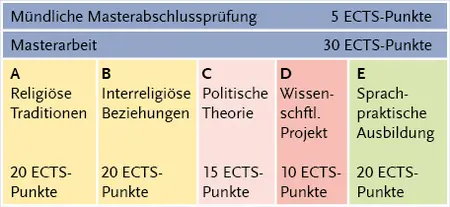Centre for Interreligious Studies (CIS)
Welcome
The ways in which religions relate to one another and the roles religions play in politics and society are controversial topics of worldwide debate. There are three levels on which the Centre for Interreligious Studies contributes to the exchange of academic ideas concerning interreligious relations and dialogue:
- Firstly, in the form of the master’s degree programme in Interreligious Studies: Judaism – Christianity – Islam. The programme focuses on the three monotheistic religions and their political, social and cultural relationships to one another. A sound, reflective knowledge of not only one’s own but also foreign religious traditions is the cornerstone of both a peaceful coexistence and a deeper understanding of religion-based conflict.
- Secondly, the CIS maintains cooperative partnerships with various institutions and individual scholars, both in Germany and abroad.
- Thirdly, CIS organises a wide range of public events that make serious intellectual discourse available to all interested members of the community.
Academic Profile
The Centre for Interreligious Studies is a cooperative research institution comprising subject fields at the University of Bamberg which address either one of the three major monotheistic religions (Judaism, Christianity and Islam), the relevance of religion in society or topics of a generally interreligious nature.
The centre serves as a hub for the interdisciplinary coordination and organisation of religious and interreligious research, teaching and continuing education. It promotes cooperative ties to all relevant institutions in Bamberg and the region, as well as to neighbouring universities’ related academic programmes and to pertinent national and international research organisations. Additionally, the CIS provides advisory services in matters relating to interreligious contact and engagement.
Members come together at general meetings (held at least once each semester) to elect a management committee and lay out a work schedule. Members elect three professors to serve on the management committee for a four year term. Of these three, one is elected to the position of managing director. CIS currently has 21 members.
Management Team
Prof. Dr. Jürgen Bründl
Anschrift: An der Universität 2, 96047 Bamberg
Raumkürzel: U2/02.06
Telefon: 0951/863-1720
E-Mail: juergen.bruendl(at)uni-bamberg.de
Prof. Dr. Patrick Franke
An der Universität 11, D-96045 Bamberg
Phone: +49 (0)951 863-2231
Email: patrick.franke(at)uni-bamberg.de
Prof. Dr. Christoph Houswitschka
An der Universität 9, 96047 Bamberg
Phone: +49 (0)951 863-2572
Email: englit(at)houswitschka.de
Prof. Dr. Susanne Talabardon (Managing Director)
An der Universität 5, D-96045 Bamberg
Phone: +49 (0)951 863-2195
Email: susanne.talabardon(at)uni-bamberg.de
Master’s Degree in Interreligious Studies
The core goal of the master’s degree programme is to impart fundamental knowledge of the major monotheistic religious traditions of Judaism, Christianity and Islam, as well as their political, social and cultural relationships to one another.
This is an interdisciplinary programme that, based on its wide-ranging curricular structure, provides students with the unique opportunity to draw on the variety of topics in the fields of Catholic and Protestant theology, Islamic studies, Jewish studies and political science to design their own individual areas of focus within the programme.
Courses are taught in German and therefore advanced German language proficiency is required.
Programme Structure and Objectives
The programme is structured on a four-semester duration of study in which students must complete a total of 120 ECTS points. Modules focus on the following topics:

A: The sacred writings of the three monotheistic religions
B: Interreligious relations in the past and present (dialogues, conflicts, encounters)
C: The relationships between authority, society and religion with regard to matters of legitimation, liberty and justice
D: Practical relevance: students participate in either an epistemological, cultural or religious event, in a practical project (e.g. “Jewish-Franconian History”) or complete an internship
E: Practical language training in Arabic, Hebrew or ancient Greek
Programme graduates are uniquely qualified to
- critically examine the three religious traditions’ sacred writings from a comparative perspective
- understand the forms and relevance of symbolisation and the development of tradition
- competently analyse and illustrate the socially formative effects of religions and their relationships to politics
- make a constructive contribution to interreligious dialogue.
- carry out academic work independently
Unique Qualities
- Flexibility and Personal Responsibility: You may attend courses from all cooperating fields according to your own interests. Scheduling flexibility: You may decide for yourself which courses you will attend in which semester.
- Language Skills: Both the diligent acquisition of language skills in Arabic, Hebrew and ancient Greek and the analysis of primary sources are among the central pillars of the programme.
- An Outstanding Academic Environment: The University of Bamberg’s small study groups, excellent departmental libraries and short distances between university facilities are distinguishing features of university life in the World Heritage city. Our subject advisory service will gladly provide assistance in all phases of your studies – from choosing a degree programme through graduation.
Contact and Advisory Services
Gabriel Jäger, M.A.
Centre for Interreligious Studies (CIS)
An der Universität 2 (mailing address)
Fleischstraße 2 (visiting address)
96045 Bamberg
Phone: +49 (0)951 863-1732
Email: gabriel.jaeger(at)uni-bamberg.de
Internet: http://www.uni-bamberg.de/zis/
